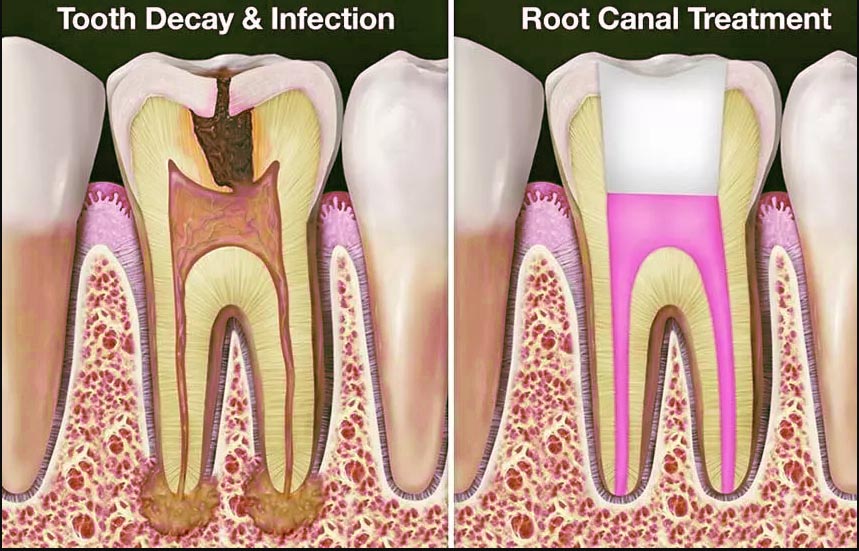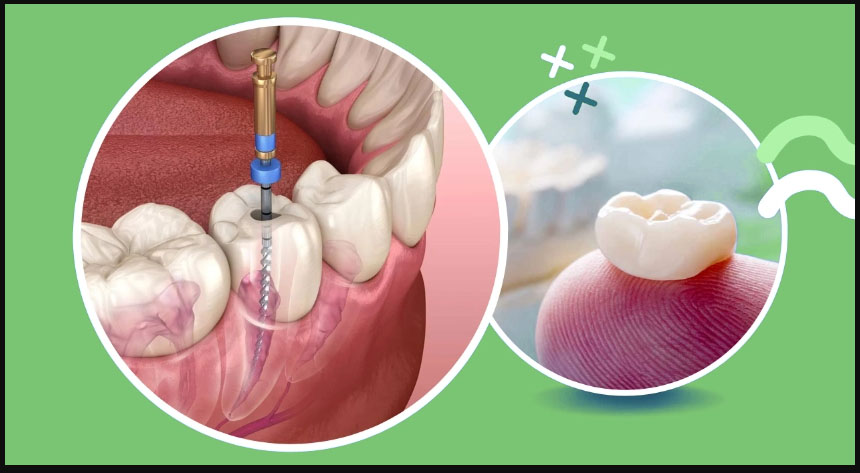Root can treatment involves repairing & saving badly infected or damaged tooth. The dentist removes the damaged pulp area of the tooth, cleans & disinfects prior to filling & sealing it up. Common causes which affect the pulp within teeth are deep cavities, cracked teeth, trauma & repeated dental procedures. Tooth pulp is soft tissue containing connective tissue, blood vessels & nerves which lie within from crown to tip of the root in the bone of the jaw. When the infected pulp is left untreated, pus would form at the root tip in jawbone & develop a ‘pus pocket’ known as an abscess. Subsequently, an abscess will cause damage to the bone around teeth alongside pain & swelling. Since this condition can injure jawbones in absence of treatment, the teeth may have to be removed as a result.
Root canal treatment generally requires one to three visits to the dental clinic. The endodontist will first remove the diseased pulp before cleaning & sealing the root canal & pulp chamber. The restored tooth with root canal treatment can last a lifetime, provided the patient continues proper care for teeth & gums. This would involve periodical checkups if necessary. The tooth will, however, remain healthy as long as it is nourished by tissues around it. Typically, there are four steps which are performed during a root canal treatment; x-rays, anesthesia, pulpectomy & filling.
Root Canal Treatment Procedure
In order to make a route to the root of the tooth, the dentist will numb the region with help of anesthesia. Subsequently, they will make an opening through the crown to the pulp chamber of the tooth. Following this, the infected or inflamed tissue will be removed. For cleaning out the infection & unhealthy pulp from the canal, special files will be used. The root canal will then be shaped for filling the material. Irrigation is used in order to clean & remove debris from the canal. The canal is subsequently filled with a permanent material which is known as gutta-percha. This is typically meant to keep the root canal free of any infection or contamination. Rebuilding the tooth is the next step, in which a temporary filling material to seal the opening is placed on top of gutta-percha. This temporary filling will remain in place until the time the tooth will receive a permanent filling or crown. Crowns which are also known as caps look just like natural teeth & are placed over the top of the tooth. In order to give crowns more support, a post is placed in some cases into the root next to gutta-percha.

Taking Care of Root Canal Following Treatment
Root canal treatments have high success rates & the following restoration along with proper care can last a lifetime. Here are some tips to take effective care of teeth after root canal treatment.
- Practicing good oral hygiene is immensely helpful. Brushing teeth two times a day & flossing at least once should be a part of this. Taking good care of teeth will be very helpful in preventing dental problems in future.
- Periodical visits to the dentist for cleaning & examination are essential.
- Chewing on hard foods should be avoided. This includes ice which can cause breakage of teeth & harm the root canals as well.
protected from decay or gum disease. Therefore, it will only be sensible of root canal treatment patients to follow good oral hygiene practices, especially around the crowded area where the tooth meets the gum.
Dental Crowns Following Root Canal Treatment
Although crowned teeth do not require any special care, it does not, however, mean that it is any way protected from decay or gum disease. Therefore, it will only be sensible of root canal treatment patients to follow good oral hygiene practices, especially around the crowded area where the tooth meets the gum.
ALSO READ: What is Dental Implant
Types of Dental Crowns
Permanent crowns are made from ceramics, porcelain-fused-to-metal, all resin, stainless steel & all metal ones like from gold or other alloys.
- All Ceramics Crowns – These all-porcelain tooth crowns provide better & a natural match for teeth than any other type of crowns. All ceramic crowns are also more suitable for people having allergies to metals. Moreover, all porcelain crowns are most suitable for front teeth.
- Porcelain-Fused-to-Metal Crowns – This type of dental crowns can be color matched with adjacent teeth & which is not possible with metallic crowns. But then there is more wearing of opposing teeth with this type of crowns in comparison with resin or metallic crowns. Sometimes, the porcelain portions of the crown are also found to break or chip off. There are also some instances when the metal underlying the porcelain portion of the crown is visible as a dark line, especially in cases where gums & gum lines have receded. However, porcelain-fused-to-metal crowns are next best to all ceramic crowns when it comes to natural looks. Moreover, these type of crowns is an ideal choice for front or back teeth as well as for lengthy bridges which require metal for strength.
- All Resin Crowns – These crowns are far less expensive than other types of crowns. But then they are found to wear down over time & are susceptible to fractures in comparison to porcelain-fused-to-metal crowns. This is why all-resin crowns are most often used as temporary crowns.
- Stainless Steel Crowns – Prefabricated stainless steel crowns are primarily used on permanent teeth as a temporary measure. Temporary crowns are meant to protect filling or tooth while a permanent crown is being made of another material. Stainless steel crowns for children are normally utilized to fit over primary teeth. These SS crowns are meant to cover the entire tooth in order to protect them from any further decay. The crown in such cases comes out normally when primary teeth make room for the new permanent teeth. Stainless steel crowns, in general, are used for children’s teeth since they do not require multiple visits to the dental clinic. Moreover, these crowns are cost-effective & there is no prophylactic dental care which is required for protection of teeth in absence of crowns.
- All Metal Crowns – Metallic crowns include gold alloys, palladium & other alloys & base metal alloys like chromium or nickel. Metallic crowns are found to better withstand biting & chewing & also last longer in terms of wear & tear. Although the metallic color is a drawback, they rarely chip or break. However, all metal crowns can be a good choice for molars which cannot be seen.
- Temporary Vs Permanent Crowns – Temporary crowns are quite often made at the dental clinic whereas permanent crowns are made in dental laboratories. While temporary crowns are either made of stainless steel or acrylic & are normally used as a temporary restoration until permanent crowns are made in the laboratory.
- Zirconia or Milled Crowns – These types of crowns are digitally made at the dental clinic in case they are having the software & hardware for production, otherwise they may require the services of a dental laboratory. Moreover, dental clinics having the ability to produce zirconia or milled crowns can complete the procedure in a single sitting & the patient will not require any temporary crowns.
Performance of Dental Crowns
Dental crowns on an average, last anywhere in-between 5 to 15 years of time. However, it is the individual amount of ‘wear & tear’ which decides the life span of crowns. Following good oral hygiene & personal habits related with a mouth like avoiding clenching & grinding of teeth, biting fingernails & chewing ice can prove to be helpful in making crowns last for longer periods of time.
Undergo Affordable Root Canal Treatment with Crowning
HealthYatra is one of the most reputed healthcare tourism company based in South Asia. Offering a wide spectrum of medical procedures to international patients, including dental procedures like root canal treatments at reasonable costs, these healthcare treatment packages can be can be availed alongside a rejuvenating vacation as well. Tourism opportunities in India comprise of beaches, mountains, wildlife, lush forests & long-cherished cultural heritage. This is especially possible along with dental procedures which do not take much time for treatments as we as for recovery.
KEYWORDS : Root canal ceramic cap cost in india, zirconia tooth cap cost in india, types of dental crowns and cost in india, ceramic tooth cap life, tooth cap after root canal price in india, permanent teeth cap price, types of crown after rct, metal free tooth cap price, permanent teeth cap price, zirconia tooth cap cost in india, tooth cap after root canal price in india, rct teeth cap price, metal ceramic teeth cap price, types of dental crowns and cost in india, porcelain crown cost in india, ceramic tooth cap price in mumbai

